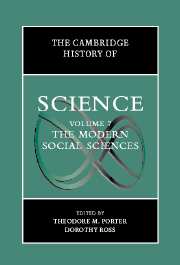Book contents
- Frontmatter
- 1 Introduction: Writing the History of Social Science
- PART I SCIENCES OF THE SOCIAL TO THE LATE NINETEENTH CENTURY
- PART II THE DISCIPLINES IN WESTERN EUROPE AND NORTH AMERICA SINCE ABOUT 1880
- 13 Changing Contours of The Social Science Disciplines
- 14 Statistics and Statistical Methods
- 15 Psychology
- 16 Economics
- 17 Political Science
- 18 Sociology
- 19 Anthropology
- 20 Geography
- 21 History and the Social Sciences
- PART III THE INTERNATIONALIZATION OF THE SOCIAL SCIENCES
- PART IV SOCIAL SCIENCE AS DISCOURSE AND PRACTICE IN PUBLIC AND PRIVATE LIFE
- Index
- References
16 - Economics
from PART II - THE DISCIPLINES IN WESTERN EUROPE AND NORTH AMERICA SINCE ABOUT 1880
Published online by Cambridge University Press: 28 March 2008
- Frontmatter
- 1 Introduction: Writing the History of Social Science
- PART I SCIENCES OF THE SOCIAL TO THE LATE NINETEENTH CENTURY
- PART II THE DISCIPLINES IN WESTERN EUROPE AND NORTH AMERICA SINCE ABOUT 1880
- 13 Changing Contours of The Social Science Disciplines
- 14 Statistics and Statistical Methods
- 15 Psychology
- 16 Economics
- 17 Political Science
- 18 Sociology
- 19 Anthropology
- 20 Geography
- 21 History and the Social Sciences
- PART III THE INTERNATIONALIZATION OF THE SOCIAL SCIENCES
- PART IV SOCIAL SCIENCE AS DISCOURSE AND PRACTICE IN PUBLIC AND PRIVATE LIFE
- Index
- References
Summary
Economics has always had two related faces in its Western tradition. In Adam Smith’s eighteenth century, as in John Stuart Mill’s nineteenth, these might be described as the science of political economy and the art of economic governance. The former aimed to describe the workings of the economy and to reveal its governing laws, while the latter was concerned with using that knowledge to fashion economic policy. In the twentieth century, these two aspects were more often contrasted as positive and normative economics. The continuity of these dual interests masked differences in the way economics was both constituted and practiced during the twentieth century, when these two aspects of economics became integrated in a particular way. These two wings of economics, originally a verbally expressed body of scientific lawlike doctrines and associated policy arts, in the twentieth century became more firmly joined together by the use of a set of technologies routinely and widely used within the practice of economics in both its scientific and policy domains.
In the twentieth-century history of economics, tool development and changes in economic theory need to be set alongside demands for advice generated by overwhelming events in the economic history of the times and strong economic ideologies in the political arena. These processes interacted to generate a Western technocratic economics very different in style and content from the economics of previous centuries, one we might characterize as an engineering science.
To understand twentieth-century economics as a science in the mold of engineering is to see that the economics profession came to rely on a certain precision of representation of the economic world, along with techniques of quantitative investigation and exact analysis that were alien to the experience of nineteenth-century economics, when the extent of such technologies of representation, analysis, and intervention were extremely limited.
- Type
- Chapter
- Information
- The Cambridge History of Science , pp. 275 - 305Publisher: Cambridge University PressPrint publication year: 2003
References
- 29
- Cited by



